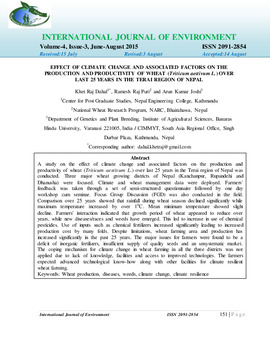Mostrar el registro sencillo del ítem
Effect of climate change and associated factors on the production and productivity of wheat (Triticum aestivum L.) over last years in the Terai Region of Nepal
| Creador: | Khet Raj Dahal |
| Creador: | Ramesh Raj Puri |
| Creador: | Joshi, A.K. |
| Año: | 2015 |
| URI: | https://hdl.handle.net/10883/21460 |
| Lenguaje: | English |
| Editor: | Progressive Sustainable Developers Nepal |
| Copyright: | CIMMYT manages Intellectual Assets as International Public Goods. The user is free to download, print, store and share this work. In case you want to translate or create any other derivative work and share or distribute such translation/derivative work, please contact CIMMYT-Knowledge-Center@cgiar.org indicating the work you want to use and the kind of use you intend; CIMMYT will contact you with the suitable license for that purpose. |
| Tipo: | Article |
| Lugar de publicación: | Nepal |
| Páginas: | 151-165 |
| Número: | 3 |
| Volumen: | 4 |
| DOI: | 10.3126/ije.v4i3.13242 |
| Descripción: | A study on the effect of climate change and associated factors on the production and productivity of wheat (Triticum aestivum L.) over last 25 years in the Terai region of Nepal was conducted. Three major wheat growing districts of Nepal (Kanchanpur, Rupandehi and Dhanusha) were focused. Climate and wheat management data were deployed. Farmers' feedback was taken through a set of semi-structured questionnaire followed by one day workshop cum seminar. Focus Group Discussion (FGD) was also conducted in the field. Comparison over 25 years showed that rainfall during wheat season declined significantly while maximum temperature increased by over 10C. Mean minimum temperature showed slight decline. Farmers' interaction indicated that growth period of wheat appeared to reduce over years, while new diseases/races and weeds have emerged. This led to increase in use of chemical pesticides. Use of inputs such as chemical fertilizers increased significantly leading to increased production cost by many folds. Despite limitations, wheat farming area and production has increased significantly in the past 25 years. The major issues for farmers were found to be a deficit of inorganic fertilizers, insufficient supply of quality seeds and an unsystematic market. The coping mechanism for climate change in wheat farming in all the three districts was not applied due to lack of knowledge, facilities and access to improved technologies. The farmers expected advanced technological know-how along with other facilities for climate resilient wheat farming. |
| Agrovoc: | WHEAT |
| Agrovoc: | CROP PRODUCTION |
| Agrovoc: | PLANT DISEASES |
| Agrovoc: | WEEDS |
| Agrovoc: | CLIMATE CHANGE |
| Agrovoc: | RESILIENCE |
| ISSN: | 2091-2854 |
| Revista: | International Journal of Environment |
Ficheros en el ítem
Este ítem aparece en la(s) siguiente(s) colección(ones)
-
Wheat
Wheat - breeding, phytopathology, physiology, quality, biotech

